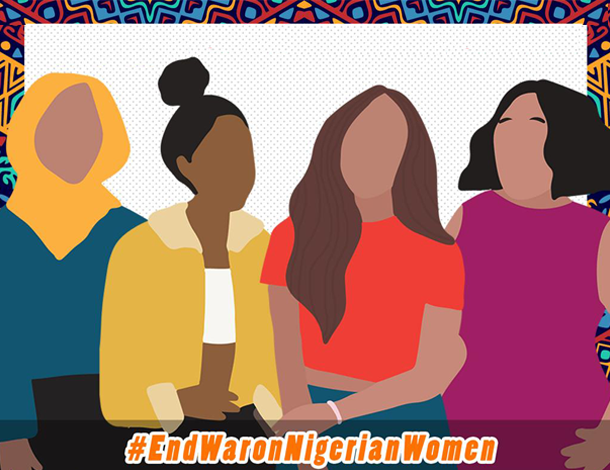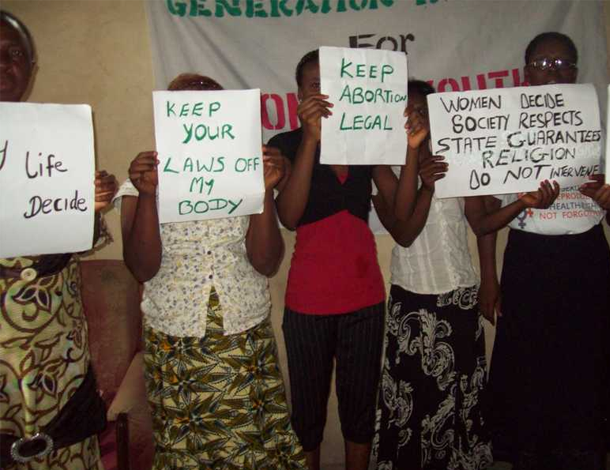“What is going on?”
A few weeks ago, police officers conducted a raid on a Marie Stopes clinic in Lagos. They harassed patients, temporarily detained a doctor, and illegally accessed confidential documents. Immediately following this deeply unnerving attack, which came on the trail of other anti-rights incidents involving state agents, a group of Nigerian feminists, women’s rights campaigners and LGBTQI+ activists came together to ask, “what is going on?”. In the course of the digital conversation that ensued, a consensus was reached: a strategic effort to undermine the sexual and reproductive health and rights of Nigerians is underway, and women’s bodily integrity is on the frontlines.

Nigeria’s patriarchal conservatism is hardly news; women, girls and queer folks in this country are regularly and legally denied their bodily autonomy, and the rate of sexual violence is high. Sexual and reproductive healthcare is extremely limited; Nigeria alone contributes more than 10% of the global burden of maternal deaths, despite representing only 2.5% of the global population, and a 2013 study showed that only 16% of Nigerian women of reproductive age (15 - 49) have access to and use contraceptives. This means more than 4 out of 5 Nigerian women are unable to medically prevent pregnancies so when they eventually do get pregnant, those who really do not have the means or desire to have children are forced to choose between birthing children they don’t want, or risking unsafe, illegal abortion. To make matters more dire, the same report also shows that despite unsafe abortion being one of the leading causes of maternal death in Nigeria, the country’s abortion rate, at 33 per 1,000 women aged between 15 and 49 years, remains higher than sub-Saharan Africa’s average of 31 per 1,000 women.
#EndWarOnNigerianWomen
In light of the above, Nigerian feminists and LGBTQI+ activists came together to increase public awareness of the war being waged on our health and bodies, drawing clear connections between incidents like unlawful detention and sexual assaults by state agents in the country’s political capital of Abuja, and police-led attacks on Marie Stopes clinics in the economic capital of Lagos. As the social media campaign under the hashtag #EndWarOnNigerianWomen gained ground, an organisation called CitizenGo began to publicly take credit for the attack on Marie Stopes in their newsletters and social media posts.
For those who may not be aware, CitizenGo is an anti-feminist, anti-queer organization with links to various U.S.-based anti-choice organisations as well as the European far right. CitizenGo is also closely affiliated with World Congress of Families, an organization founded in the 1990s by US Christian right figure Allan Carlson, with the central objective of nurturing a worldwide network of ultra-conservative ‘pro-family’ organizations, thinkers, State officials, and religious actors. CitizenGo also claimed credit for similar raids on clinics in Kenya, Malawi, Niger and Tanzania, even as they spread sensationalist misinformation about the state of reproductive healthcare in Nigeria via petitions and through lobby groups and faith-based organisations. Their activities, as described in their own communications, include training and partnering with local anti-choice organisations in various countries to ‘confront’ the ‘radical left’ in order to limit women’s reproductive rights and ‘promote family values’.
In many countries across the world, including the U.S., women’s health, safety and bodily autonomy are actively being undermined by actors like CitizenGo. Their strategy is to drive policy conversations at multilateral meetings like the Commission on the Status of Women as well as with government officials and agencies, while partnering with local organisations such as the Nigeria-based Culture of Life Africa, founded by UK-based Catholic anti-choice activist Obianuju Ekeocha; and the Foundation for African Cultural Heritage, a 17-member coalition, to advocate for ‘pro-family’, ‘pro-life’ values that include ‘the right to life from conception to natural death’. Together, these coalitions are pushing a carefully designed campaign of misinformation, sensationalism and half-truths about the activities of pro-choice organisations in order to ensure that all Nigerians, and possibly even Sub-Saharan Africans, are forced to adhere to a one-dimensional interpretation of ‘(Christian) family values’ which enthrone unchecked reproduction within heterosexual marriage at any cost.

Contrary to the lies that these organisations peddle however, pro-choice groups do not exist to profit from improved sexual and reproductive healthcare access and services. Rather, they take an evidence-based approach to ensure that people have access to the information, tools and resources that allow them to plan and manage reproductive outcomes, including pregnancy, in ways that ensure the greatest social good by preserving the lives and health of those directly affected. On the other hand, rolling back the access that women, girls and people have to contraception, comprehensive sex and sexuality education, and safe abortions, only forces women to prioritise the possibility of a full-term pregnancy and birth over everything else—including their health, safety, economic prospects, and even the quality of life of any children that might result from such pregnancies. And inevitably, it is the most vulnerable among women and children who bear the greatest burden of illness, stigma and death that result from such situations.
I have firsthand knowledge of what life is like when groups like CitizenGo succeed in limiting access to sexual and reproductive health education and services. In 2012 I gave birth to a daughter, having gotten pregnant as a result of inadequate sex education and incorrect use of contraception. The Guttmacher Institute reported that 25% of all pregnancies in Nigeria in the year my daughter was born were unintended. 32% of those who, like me, found themselves pregnant in 2012 carried their pregnancies to term. 12% had miscarriages. But more than half—56%, to be precise—elected to abort their pregnancies, even though the highly restrictive laws in Nigeria put anyone seeking abortions at risk of up to 14 years in prison. Statistics like these indicate why the services of organisations like Marie Stopes are so important, and also why we need to urgently protect and advance the sexual and reproductive health and rights of all Nigerians.
Comprehensive sexual and reproductive healthcare services are essential to social and economic prosperity for everyone, not just women.
Abortions only become necessary after conception, and unplanned pregnancies are generally preventable. We have ample evidence that when people, especially women and young girls, have access to quality education—including age-appropriate, comprehensive sex education—as well as non-discriminatory healthcare, including contraception, the inevitable result is fewer abortions. Insisting wholesale on denying women and girls access to safe abortions, while also organising coordinated attacks against organisations that help people prevent unplanned and unwanted pregnancies, manage their sexual and reproductive health, and recover from complications related to procuring unsafe abortions, is very simply condemning women and girls to death.
Valuing life has to mean more than valuing the birth of every child that could potentially result from a pregnancy.
The fact of an existing pregnancy does not automatically make any person willing, ready or able to either carry a pregnancy to term or become a good, capable parent. When anti-choice groups such as CitizenGo and the Foundation for African Cultural Heritage organise physical and media attacks on clinics like Marie Stopes which offer sexual and reproductive health services to mostly low-income women, they make it clear that they do not care about the lives of the women or even the children they claim to be so invested in. This is why Nigerian feminists, healthcare activists and women’s rights organisers have come together, under the banner of the #EndWarOnNigerianWomen campaign, to resist the jeopardisation of women and girls’ lives by such hate groups and religious fundamentalists.
The Nigerian National Strategic Health Development plan for 2018 - 2022 includes the need to “Promote universal access to comprehensive quality sexual and reproductive health services throughout the life cycle and reduce maternal, neonatal, child and adolescent morbidity and mortality in Nigeria.”
To really care for life, all of the women, babies, children and minors captured in that statement must have access to a full bouquet of health services that allow them to live long and live well. An insistence that foetuses become babies at all costs, even when that cost is the lives and wellbeing of hundreds of women and girls, is not pro-life. It is misogynistic. And it must be resisted.
